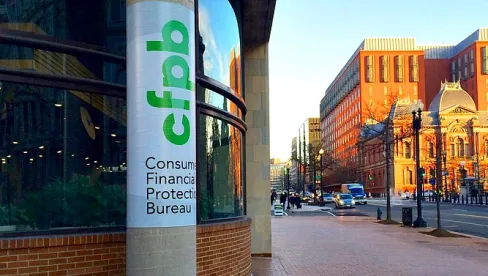|
Go-To Guide: |
|
On March 8, 2023, the Consumer Financial Protection Bureau (CFPB) released the Supervisory Highlights Junk Fees Special Edition (Report) detailing unlawful fees the agency found in deposit accounts and in multiple loan servicing markets during CFPB examinations completed between July 1, 2022, and Feb. 1, 2023.
The CFPB has launched an initiative to scrutinize unlawful fees that banks and financial companies charge, referred to by the CFPB as “junk fees.” The Report sheds light on fee practices that CFPB examiners have identified as unfair, deceptive or abusive in five product markets: deposit accounts, auto loan, mortgage, student loan servicing, and payday/small loan lending. This GT Alert discusses the supervisory findings and remedial actions taken to address such findings for each product market.
-
Deposit Accounts
-
APSN fees. The Report reviews unfair Authorize Positive, Settle Negative (APSN) overdraft fees for transactions authorized against a positive balance but settled against a negative balance. The CFPB previously addressed this practice in Consumer Financial Protection Circular 2022-06. The agency found at least tens of millions of dollars of injurious APSN fees thus far. As a result of these findings, the institutions were directed to cease charging APSN fees and to conduct lookbacks and issue remediation to consumers. Institutions are providing redress to over 170,000 affected individuals.
-
NSF fees. Examiners found that institutions were engaged in the unfair assessment of multiple non-sufficient funds (NSF) fees for a single transaction when the same transaction was presented multiple times for payment against an insufficient balance in the consumer’s account. The Federal Deposit Insurance Corporation (FDIC) has previously published guidance advising supervised institutions of the consumer compliance risks associated with multiple NSF fee practices that may be unlawful.1 The examined institutions agreed to cease charging NSF fees for unpaid transactions entirely, and the CFPB directed the institutions to refund consumers appropriately. In the course of CFPB’s review of NSF fees, virtually all institutions engaged on this issue reported plans to stop charging NSF fees altogether.
-
-
Auto Loan Servicing
-
Overcharging late fees. The Report highlights servicers that assessed unfair late fees in excess of the amounts allowed by consumers’ contracts. In response to these findings, the servicers ceased the practice and refunded late fee overcharges to consumers.
-
Unauthorized late fees after repossession and acceleration. Examiners identified that servicers engaged in illegal fee practices by charging late fees even after vehicles were repossessed and subsequent to the date when loan balances were accelerated. In response to these findings, servicers ceased the practice and refunded late fees to consumers.
-
Estimated repossession fees significantly higher than average repossession costs. The CFPB determined that servicers acted unfairly or engaged in unfair practices when they charged estimated repossession fees significantly higher than the actual costs they purported to cover. In response to these findings, servicers ceased the practice and refunded affected consumers.
-
Pay-to-pay fees. Examiners identified illegal servicing practices when servicers charged and profited from payment processing fees that far exceeded the servicers’ costs for processing payments, known as “pay-to-pay” fees. In response to these findings, the CFPB directed the servicers to cease the practice.
-
-
Mortgage Servicing
-
Overcharging late fees. Examiners found that servicers engaged in illegal fee practices by assessing late fees in excess of the amounts allowed by their loan agreements and violated Regulation Z2 by issuing periodic statements containing inaccurate late payment fee amounts. In response to these findings, servicers waived or refunded late fee overcharges to consumers and corrected the periodic statements.
-
Repeat charges for unnecessary inspections. The CFPB identified unfair acts or practices when servicers charged consumers for repeat property preservation visits to known bad addresses. In response to the findings, the servicers revised their policies and procedures and waived or refunded the fees.
-
Misrepresenting owed PMI premiums. Examiners identified illegal servicing practices when servicers sent consumers monthly periodic statements and escrow disclosures that included monthly private mortgage insurance (PMI) premiums that consumers did not owe. These loans were originated with lender-paid PMI, which should not be billed directly to consumers. In response to these findings, the servicers refunded any overpayments.
-
Charging fees that should have been waived under the CARES Act. The CFPB advised that servicers engaged in unfair acts or practices when they failed to waive certain late charges, fees, and penalties accrued outside forbearance periods, where required by HUD, upon a consumer entering a permanent COVID-19 loss mitigation option. In response to the finding, the servicers improved their controls, waived all improper charges, and provided refunds to consumers.
-
Charging for PMI after it should have been removed. Examiners found that servicers violated the Homeowners Protection Act when they failed to terminate PMI on the date the mortgage’s principal balance was first scheduled to reach 78% loan-to-value. In response to these findings, the servicers refunded excess PMI payments and implemented additional procedures and controls to enhance their PMI handling.
-
Late fees charged after statements indicated $0 late fee. Examiners identified unfair acts or practices when servicers sent periodic statements to consumers in their last month of forbearance that incorrectly listed a $0 late fee for subsequent payments, when a late fee was in fact charged if a payment was late. In response to this finding, the servicers updated their periodic statements and waived or refunded late fee charges for the specific payments.
-
-
Payday and Small-Dollar Lending
-
Splitting and re-presenting consumer payments. Examiners found that after unsuccessful debit attempts, lenders split missed payments into as many as four sub-payments and simultaneously re-presented them to consumers’ banks for payment without authorization, thus causing consumers to incur multiple overdraft fees and loss of funds. In response to these findings, lenders were directed to: (1) provide remediation; (2) stop engaging in the practice without first obtaining consumer authorization; and (3) stop the practice of splitting the single amount owed into several debit attempts, unless the consumer has sufficient time between each debit attempt to learn of any successful debits and to take action to avoid incurring unwanted consequences.
-
Unauthorized repossession-related fees. Examiners identified that some lenders charged borrowers unexpected fees to retrieve personal property from repossessed vehicles and to cover servicer charges and withheld the personal property and vehicles until borrowers paid the fees that were not authorized in a borrower’s title loan contract. Lenders were directed to enhance their compliance management systems to prevent these practices and to provide remediation to affected consumers.
-
Failure to timely stop repossessions, charging fees, and refinancing despite payment arrangements. Examiners noted that lenders failed to stop vehicle repossessions before title loan payments were due as-agreed, and then withheld the vehicles until consumers paid repossession-related fees and refinanced their debts despite prior payment arrangements. Lenders were directed to enhance their compliance management systems to prevent these practices and to provide remediation to affected consumers.
-
-
Student Loan Servicing
-
Charging late fees and interest after reversing payments. The CFPB found that servicers sometimes charged late fees and interest after payments were erroneously accepted by customer representatives via credit card payment, despite credit card payments being against policy. The servicers then cancelled the payments and did not offer borrowers the chance to pay again, but instead charged additional fees and interest without notice to the borrowers. CFPB directed the servicers to reimburse any late fees and correct any negative credit reporting as a result of reversed credit card payments and ordered servicers to enhance payment processing controls to prevent the acceptance of credit card payments.
-
Regulatory Outlook
The CFPB’s prior supervision work led the agency to issue guidance in October 2022 on the longstanding problem of surprise overdraft fees. This Report demonstrates that the CFPB remains vigilant about unlawful fees and the degree to which the CFPB may scrutinize fee practices. Further, this Report was published the same day Biden administration officials hosted a virtual event for hundreds of state lawmakers, encouraging them to take their own actions on junk fees. The White House simultaneously released a guide that offers potential enforcement, legislative, and contracting approaches that state leaders could use to address junk fees. As a result of the dual CFPB and White House efforts, certain other state and federal regulators may increase their scrutiny regarding fee practices and utilize various avenues of enforcement authority against institutions and companies.
Conclusion
In line with the CFPB’s statement regarding responsible business conduct, depository institutions and participants in the payday and title lending and multiple loan servicing markets may wish to consider self-assessing their compliance with federal and state consumer financial services laws and the Report’s supervisory findings.3
FOOTNOTES
1 See FDIC, Supervisory Guidance on Multiple Re-Presentment NSF Fees 1, 1 (August 2022) (noting that the FDIC identified violations of law during consumer compliance examinations when financial institutions charged multiple NSF fees for the same transaction).
2 12 C.F.R. § 1026.41(d)(1)(ii).




 />i
/>i

